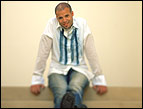WEB EXCLUSIVE
George Rowe: From Law to Lyrics
By Laura Bagby
CBN.com Producer
CBN.com –
I first heard George Rowe sing at Michael W. Smith's Celebration
Tour late 2003. When the band took a break from singing, Michael
promoted George's new album, Think About That (Rocketown,
2003). I liked the rhythm and clarity of George's voice, so I
made a mental note of picking the album up upon release.
About three months later, George and I sat in a café in
the Charlotte Convention Center and chatted about his new life
as a professional, full-time singer, a venture he had been enjoying,
at that time, for a mere five or six months.
So how did God handpick George Rowe for the chance of a lifetime? It
all starts at the beginning.
Saved From Sure Death
At birth Rowe was put up for adoption by his biological mother and entered
the cruel world of the foster care system of Newark, New Jersey, where he
suffered much neglect. "I was placed with foster parents that didn't
feed me," he says. "I was pretty sickly -- skinny arms and skinny
legs and bloated stomach." Rowe was hospitalized for malnourishment.
At age 11/2, still in very poor health, Rowe got adopted by George (his namesake),
a chemical plant worker, and Ida, a cafeteria worker at a local college, to
become George Rowe, III. Second in a line of three daughters and the second
to be adopted, George grew up in Clayton, New Jersey, a one-traffic-light
town outside Philly, where his new parents nurtured him back to health.
"They saved my life on many levels," says George about his adopted
parents. "They are committed believers. I know that if it weren't for
them, I don't know if I would be alive physically. Who knows if I would know
the Lord if it weren't for them."
From Attorney to Singer
Coming from what he calls 'an average, blue-collar family,' George decided
against going the route of the starving artist, though he says he always loved
singing, and opted to put his scholarship to use and attend law school at
Pepperdine University in Malibu, Calif. Upon graduation, George landed a comfortable
job as a tax and estate planner. It was a good means to support him and his
wife, Merritt, and their children.
"I am the only one who has gone to college, let alone law school,"
says George, "so I was pretty proud of myself and enjoyed being able
to buy things that we couldn't have when I was a kid."
While earning a good living as an attorney, George was still drawn to music,
so he spent much of his free time during nights and weekends traveling and
singing at various venues, including churches, colleges, rallies, festivals,
and retreats.
Others began to notice George's talent. That's when George began to seriously
question his choice of occupation.
Says George, "Everyone, whether you knew me or you had just met me,
you could tell that my passion was to do this music ministry."
That included his law peers -- even his law school dean, who George calls
'one of my strongest advocates.' George says the dean was constantly sending
out demos to people he knew in the music business.
But the clincher was how Merritt and George felt about the career change.
"It got to the point where my wife and I thought, Why are you wasting
your time doing this other thing? Your heart is called to do something else.
Obey that call," says George.
So George borrowed money from his friends, created a low-budget CD, and traveled
around singing and selling his album. George eventually got "discovered"
after doing a concert in Nashville. Some people in the audience that night
approached George and told him they knew someone who worked at Rocketown Records.
They asked George if they could send their Rocketown contact his CD. And that
is how it all began.
George is quick to say he doesn't regret his law training. In fact, it has
come in handy in his new career.
"It has been valuable to be able to do practical things like read my
own contracts. I don't represent myself. Law School 101 is 'don't ever represent
yourself,' so I have a great attorney," he says with a laugh.
While negotiating his record deal, George and his family moved in with his
wife's sister in Little Rock, Ark., because he says they couldn't afford to
live in Los Angeles. From there, George commuted six hours each way twice
a week to Nashville in a noisy jeep with no radio. During those hours on the
road, George would get ideas for songs and jot them down on a legal pad.
On Tour with Michael
 George
had only known Michael W. Smith personally for about a year and was already
signed to the label and awaiting the soon release of his new album, Think
About That, when he got the phone call from Michael W. Smith to join him,
Amy Grant, and MercyMe for the Celebration Tour. George
had only known Michael W. Smith personally for about a year and was already
signed to the label and awaiting the soon release of his new album, Think
About That, when he got the phone call from Michael W. Smith to join him,
Amy Grant, and MercyMe for the Celebration Tour.
So fall 2003, George signed up, juggling Michael's Celebration
Tour with the Night in Rocketown tour with Shaun Groves, Ginny
Owens, and Christine Dente.
Touring wasn't nearly as grueling as it could have been, thanks in part to
frequent visits home to see family and the close-knit, Christian nature of
George's band mates.
"It is nice to be able to start off your time 'at work' with a prayer
and to pray after the job is done, and where your job is to worship and to
share the gospel with people," he says.
And what could be more thrilling than hanging out with Michael?
"He has been a great friend, great support through all this, unlike
most record label owners," says George about his relationship with Michael
W. Smith. "He is a good person, a generous person."
In fact, George, a self-confessed insomniac, recalls one particular night
on the bus when both he and Michael were up late and George got the chance
to have a heart-to-heart discussion.
"I remember just picking his brain, like the attorney in me likes to
do, and asking him really practical things like, 'How do you balance the ministry
side with the business side of things? You seem to be a successful father
and husband. How do you do that while you are away?' We were up until 3:30
a.m. It was a really unique, fun, educational time."
The Family Man
George comes from a big family. Though his immediate family is only four
strong, he has a large extended family.
"My mom is one of seven brothers and sisters. My dad is one of sixteen
brothers and sisters. All those aunts and uncles of mine have at least four
kids. Some have up to twelve or thirteen kids. So I know that I have over
120 first cousins all in the same one-traffic-light town," George explains.
George and his wife, Merrit, who will have been married 13 years
this June, currently have three children of their own, Ireland,
6, Addyson, 5, and Jake, 3, and have considered adopting to extend
their family.
George has nothing but good things to say about his wife and her abilities.
"She is playing single parent 24 hours a day, but she does it so beautifully,
so graciously, without complaint," he says.
But George and Merritt weren't always on such good terms. When they first
met on campus at Northeastern Christian College in Pennsylvania, George was
a student and Merritt worked as the registrar, and they didn't exactly hit
it off.
"She would come in in this professional business suits and a briefcase,"
George recalls. "She was great at systematizing things and organizing
things and being really efficient. And I just thought, Who is this woman,
this Boston woman, so cold, no heart? I was student body president and
was in the band. She thought that I thought that I was the big man on campus.
We clashed, so it seemed."
It wasn't until George found a sympathetic ear in Merritt after a relationship
breakup that George realized how nice Merritt was. George and Merritt began
to spend time together as friends. Two and a half years later, they married.
Though Merritt is now very supportive of George's new career, George doesn't
take his wife and her needs for granted.
"I wouldn't be surprised and I will understand when that day comes where
she says, 'I am tired. I need you home.' I will be sympathetic. But for now,
she is nothing but a cheerleader," he says.
And though George loves what he is doing, he knows he is highly dependent
on God to bring in the finances to support him and his family.
"When you do this kind of thing, you aren't doing it for the money,"
says George. "You live like you are out on the mission field. It is tough
financially. God is taking care of us. It is a faith-building process."
'Think About That': The Album
 One
of the most talked about songs on the album and George's personal favorite
is "Broken," which George says he wrote while still debating about
his change of vocation. George is still amazed that this song, a prayer to
God and his most vulnerable piece, only took him four hours to write. One
of the most talked about songs on the album and George's personal favorite
is "Broken," which George says he wrote while still debating about
his change of vocation. George is still amazed that this song, a prayer to
God and his most vulnerable piece, only took him four hours to write.
'I like to give the perception that I am on top of the world, I am in charge,
I have everything under control. And to write the song and to let people know
that I am actually broken and struggling and confused, it is embarrassingly
exposing, even with my wife," he says.
Despite his initial hesitancy, George says he played the song for his wife.
Her response was to gently redirect George to consider what he was most thankful
for and to live out Philippians 4:8. That is when George says he came up with
the title song for the album, "Think About That."
Looking Ahead
Last April and May, George toured with Ginny Owens, but George
admits that though he loves singing, being on stage can be a daunting
experience.
"I still get stage fright," he reveals. "There are moments
when the thought will go through my mind, What in the world are you doing
up there? You are an attorney. You have no business singing up there.
I get these little panics because I am thinking about myself rather than what
I am supposed to be doing."
Still, George says he finds purpose in his new career as a singer.
"What takes a pastor 30 minutes to say, or a book 400 pages to say,
or Mel Gibson three-and-a-half hours to say, I have to say in three-and-a-half
minutes, and I can. And for some reason, it affects people universally. …
As long as God puts me in these positions and allows me to do this, I am loving
doing this," he concludes.
|